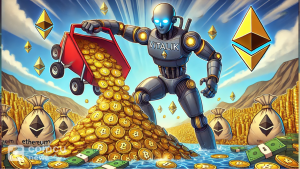GitHub is a widely recognized website for hosting code that serves as a popular platform for developers. It allows developers to share their code with the GitHub community, collaborate on projects, and track changes across different versions of code-based projects. GitHub is built on Git, a software developed by Linus Torvalds, who is also known for creating the Linux operating system.
GitHub plays a vital role in the field of cryptocurrencies and blockchain technology. Many popular blockchain-based projects are hosted on GitHub, allowing developers from all over the world to contribute to their code. Projects like Bitcoin, Ethereum, Stellar, and Cardano, among others, are freely accessible on GitHub. This global collaboration on blockchain developments has significantly contributed to the growth of the cryptocurrency industry.
What is The Power of Collaboration?
One of the main goals of GitHub is to promote collaboration among developers. By providing a platform for sharing and working together on projects, GitHub enables developers to leverage the knowledge and expertise of a global community.
GitHub offers features that facilitate collaboration, such as issue tracking, pull requests, and code reviews. These features allow developers to communicate, discuss ideas, suggest improvements, and review code changes. This collaborative environment helps ensure the quality and security of software projects.
Moreover, GitHub provides a platform for developers to showcase their work, gain recognition, and build a professional network. By actively participating in open-source projects hosted on GitHub, developers can demonstrate their skills and establish their reputation within the community.
What are the security measures and open-source challenges?
While GitHub is an open-source platform that encourages transparency and global collaboration, it also faces certain challenges in terms of security.
Because anyone can view code and projects on GitHub, there is always a risk of malicious attacks. However, GitHub has implemented measures to address these concerns and protect the integrity and security of the platform.
One of the primary security measures is requiring users to have registered GitHub accounts in order to have editing rights. This ensures that only trusted contributors can make changes to projects. Additionally, GitHub has a community-driven moderation system where users can report suspicious or harmful content, further enhancing the platform’s security.
Despite these security measures, there have been instances where GitHub’s servers were exploited for crypto mining operations. In response, GitHub promptly took action to mitigate the impact of such incidents and prevent future abuse.
What are the open-source blockchain projects on GitHub?
GitHub has been instrumental in the growth and development of the blockchain industry. Many blockchain projects, including cryptocurrencies, decentralized applications (dApps), and smart contract platforms, host their code on GitHub.
For example, Bitcoin, the pioneering cryptocurrency, has its codebase publicly available on GitHub. This allows developers from all over the world to contribute to the code, propose improvements, and suggest new features. The transparency and accessibility of Bitcoin’s code on GitHub have contributed to its widespread adoption and community-driven development.
Ethereum, another significant blockchain platform, also relies heavily on GitHub for collaboration. Ethereum’s codebase, along with its smart contract language Solidity and various Ethereum Improvement Proposals (EIPs), are hosted on GitHub. This open-source approach has allowed developers to build decentralized applications and create new tokens on the Ethereum blockchain.
Similarly, Stellar, a blockchain platform focused on facilitating cross-border payments and asset transfers, has its code hosted on GitHub. Developers can actively contribute to the platform’s codebase, improving its security, performance, and functionality.
Cardano, a blockchain platform known for its scientific approach and rigorous peer-review process, also hosts its code on GitHub. The Cardano community actively contributes to its development, proposing and implementing changes through GitHub’s collaboration features.
What is the conclusion?
GitHub has revolutionized the way developers collaborate, share code, and contribute to open-source projects. Its intuitive interface, powerful collaboration features, and support for various programming languages have made it a go-to platform for developers worldwide.
In the context of cryptocurrencies and blockchain technology, GitHub has played a vital role in enabling global collaboration on innovative projects. Many blockchain-based projects, including Bitcoin, Ethereum, Stellar, and Cardano, among others, have their code openly accessible on GitHub. This transparency fosters community-driven development, accelerates innovation, and builds trust in the blockchain industry.
Despite the challenges associated with maintaining security in an open-source environment, GitHub has implemented measures to protect the integrity of the platform and its users. By requiring registered accounts for editing privileges and encouraging community-driven moderation, GitHub aims to provide a secure and collaborative environment for developers.
As the world of technology and software development continues to evolve, GitHub remains a key player in facilitating global collaboration and driving innovation in the blockchain and cryptocurrency space.














